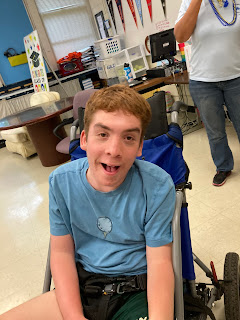Parents of special needs children often get lumped together for a variety of reasons. On the surface we seemingly have the same needs, concerns and experiences. In many ways, we do face similar issues and experiences; however, the way in which we handle the emotional, mental and physical demands may be different. A challenging situation for one parent may not be for someone else, and a support system for one family may be a strain on another.
I was reminded of this when I met a friend for breakfast a few weeks ago. Her son has the same ACC diagnosis as Ben. We do have a lot in common and an instant friendship was formed when a camp director introduced us because of our ACC connection (what a pun!) That morning, she shared how every night since her son was born (he is 14 years old), she checks on him 5-6 times a night to make sure he is okay. It is the only time she feels he is safe.
Then she asked me, "Don't you do that too?" After a brief pause, I shamefully, said, "No. After I am asleep, that's it. I don't worry while Ben is asleep, and I value my sleep too much to wake up that often." I felt a bit selfish. I think she was surprised that I did not have the same routine.
Two moms with kids with the same diagnosis - different worries, different ways to cope. Neither is better than the other - just different. We are all affected by our child with special needs - the joys, the worries, the frustration, the anger and the denial. The way in which we deal with all of it is based on the skills and characteristics we possess and our own life experiences.
Over the past few weeks, I contacted nine mothers of children with special needs. My relationship with each of them is varied, from best friend from high school to mother of Ben's former classmate. I asked them if they would be willing to answer one question a month about their experiences raising a child with special needs.
This new series, eSpecially Parents, will highlight how these nine parents are coping in their situations. You may not identify with every mom, but you may be able to understand similar struggles and learn from their experiences.
Once a month, they will each answer one question in their own unique way using stories, photos and personal experiences. This series will begin tomorrow and will be interspersed with the regular eSpecially Ben posts.

Such an awesome idea. I recently read a book compiled by a group of special needs parents and, other than still feeling pretty isolated due to my son's fairly rare condition (Rubinstein-Taybi Syndrome), I also felt that while having a SN kid is not ALL doom and gloom, many of the stories seemed just too sugar-coated so really look forward to reading some "real" stories :)
ReplyDelete